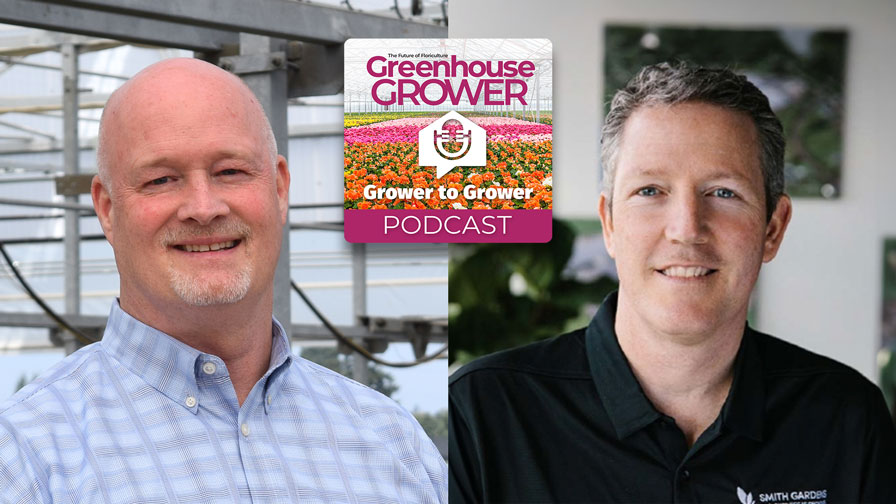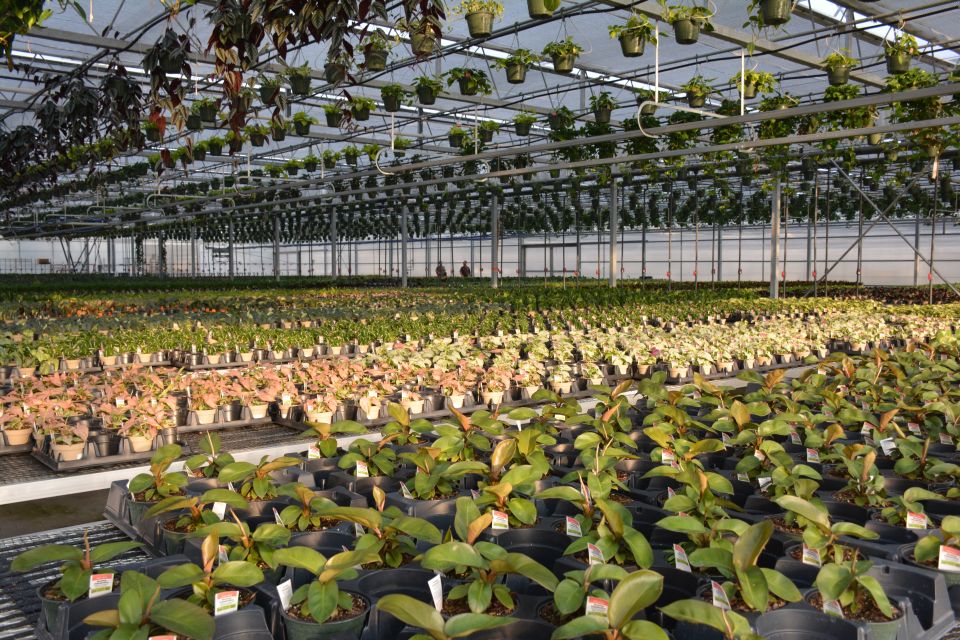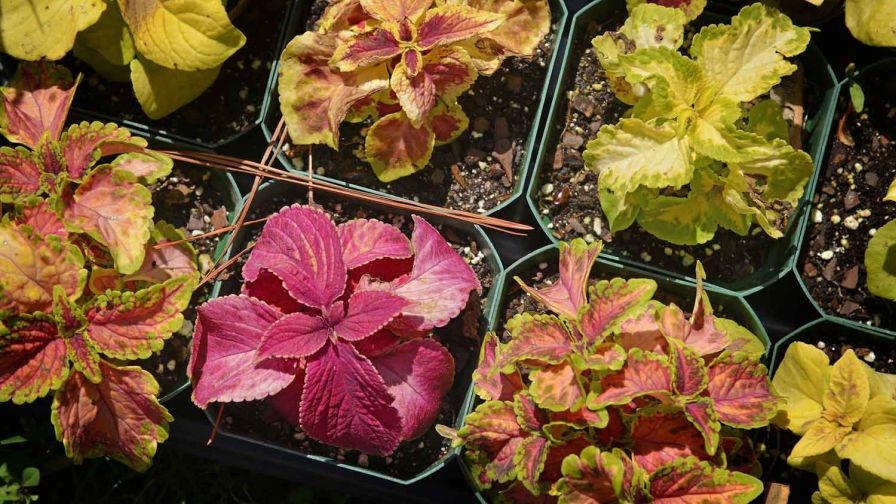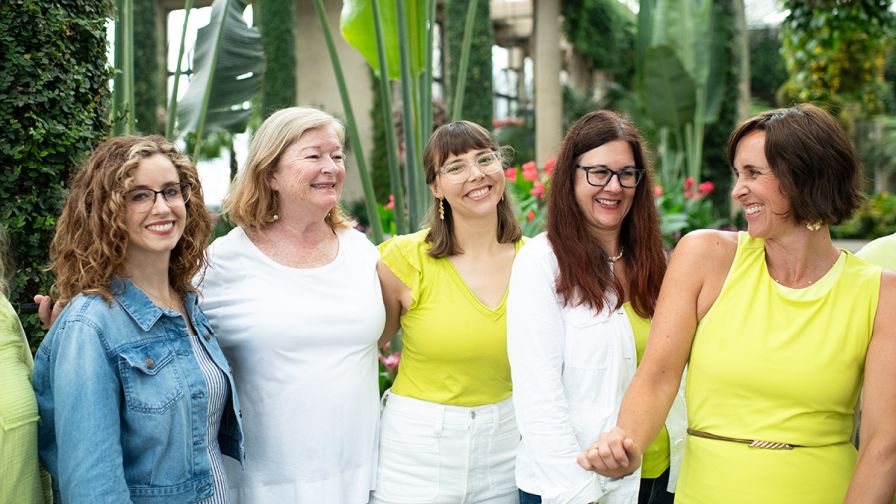Hustle Is the Heart of Groovy Plants Ranch
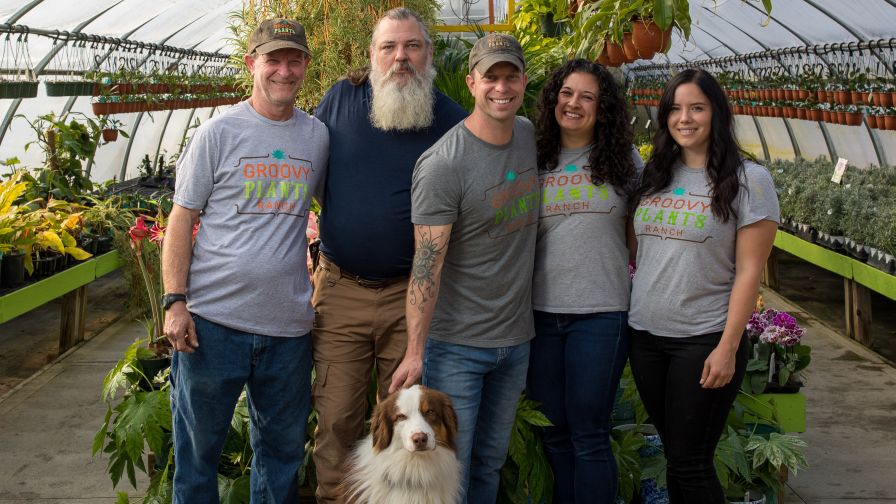
From left, Craig Powell, Larry Riegel, Jared Hughes, Liz Hughes, and Felicia Bonaduce work well as a team to manage Groovy Plants Ranch, as well as Brisco, one of two Australian Shepherds that belong to the Hughes family. Photos: Grace E. Jones Photography
Jared and Liz Hughes are no strangers to hustle and grind. As the co-owners of Groovy Plants Ranch, they are using their small footprint to make a big impact. Groovy Plants Ranch (GPR), a grower-retailer in Marengo, OH, takes a unique approach to retail, marketing, and plants. GPR’s 30,988-square-foot facility turns out more than 600 varieties of plants, including succulents, perennials, houseplants, annuals, herbs, and vegetables. The team of nine year-round employees pour their heart and soul into their crops to make GPR a destination for plant lovers and tourists alike.
In 2007, at age 18, Jared founded The Groovy Agave LLC, a small growing outfit focused on landscaping and container design. At the same time, he worked at Foertmeyer & Sons Greenhouse in Delaware, OH, serving as the retail manager. Jared bought his first greenhouse in 2009. He propagated succulents and sold them to local greenhouses, also making sales at local farmers markets and flea markets. After Jared and Liz were married in 2015, they had an opportunity to purchase the former Fargo Herbs property, which is the current location for Groovy Plants Ranch.
“It really caught on like wildfire here in central Ohio,” Jared says. “We’ve always had a unique, different mix of plants.”
GPR is not just known by local gardeners anymore. It has popped up on Facebook groups listing must-see stops for Ohio road trips. Many customers say they saw pictures of Groovy Plants Ranch online and wanted to see it in person. Liz says people from three to five states away regularly visit the store.
The philosophy at Groovy Plants Ranch is to offer more varieties in smaller numbers, Liz says. This allows the operation to offer something for everyone, whether customers are looking for a rare succulent or a common variety to add to their gardens. For example, in its vegetable collection, GPR offers ‘Super Sweet 100’ tomatoes for some customers, while also offering ‘Black Cherry’ and ‘Sunrise Bumble Bee’ tomatoes for others.
Jared says the same is true of GPR’s succulent collection. Most retailers have a succulent section, but he has a greenhouse devoted to succulents ranging from starters to specimen-sized. The operation is primarily for retail, but also sells wholesale and has a significant collector’s market.
New Facilities Aid in Efficiency
“If a retailer has a houseplant section, it’s really hit or miss what you can find there,” Jared says. “Because we go so deep into it, there’s a good chance you can find what you were looking for and maybe some things you didn’t know you were looking for.”
Craig Powell, Perennial Department Manager, says GPR does a lot of its own cuttings and grows many unique varieties from seed. About eight months ago, GPR renovated a structure on the property to create a propagation house, which aids in production efficiency.
Larry Riegel works in construction and maintenance at GPR. He played a major role in the development of the propagation house, which has a boiler system, a mist system, and heated water tubes on the tables. Riegel says this cut the turnaround time for some crops from months to weeks.
“For our mist system, we brought it up through the bench instead of hanging it from the ceiling to give us tighter control on water and cut down on the overall humidity,” he says.
Powell says the growing team must watch the plants carefully so they do not receive too much moisture. Certain varieties, such as silver foliage plants, can go by the wayside quickly if they are overwatered.
“The hardest thing in the propagation house is dealing with the moisture requirements of so many different plants,” Powell says. “You can set the mist system four or five different ways for the time and duration. You must watch as they’re finishing. If something is getting too much water, you need to pull it off right away and put it on another table that’s not getting mist.”
Jared says GPR is in the process of building a 6,600-square-foot headhouse with heated floors so employees can use it as a production and a working space. It will be connected to the other four greenhouses, making it easy to move the product.
To offer so many varieties in a limited amount of space, GPR has learned to use space efficiently and turn crops quickly. Jared says he pushes the envelope for how soon the plants can be moved outside. He moves plants outside in late February or early March and rarely has issues.
“You can’t control the weather, but we know how to grow, and we do our due diligence to harden things off,” Jared says of GPR’s production practices. “By cramming as many rotations through our small footprint as possible, we get the most profitability out of the square footage.”
Powell says GPR moves plants out to the retail space as soon as possible. For example, when the racks of annuals arrive from a contract grower, employees drop what they are doing and move them into the shop. Even if they can’t get the plants on the tables yet, customers can see them when they come to the store.
“If you’re going to be small, be fast,” Jared says.
Eco-Friendly Practices
Groovy Plants Ranch is also trending toward compostable pots. Jared expects this conversation to gain traction in the horticulture industry and wants to be ahead of the game. The operation has tested a series of compostable pots and found that fiber pots were best due to their ability to biodegrade and their sturdiness to withstand customer use. The cost will be passed on to the consumers, Jared says.
“We tried those with our herbs last year and some of our succulents in longer production to see how long they held up. We found a couple companies that we’re happy with the product,” Liz says of
GPR’s trials with eco-friendly pots. “Some compostable pots are either too flimsy for anything besides vegetable production because they’re done after six weeks, or they’re so robust that they aren’t compostable.”
During his time at Foertmeyer & Sons Greenhouse, Jared learned about its robust biological control system. He says Groovy Plants Ranch is also using biocontrols, which he has found to be more effective than some pesticides.
“Anyone who does biological control will say you constantly have to be on top of it,” Jared says. “One of our biggest challenges is that we bring in a fair amount of plant material from Florida. Since we’re introducing new plant material into our space, it brings another challenge of control into the mix. Predatory mites have been very helpful.”
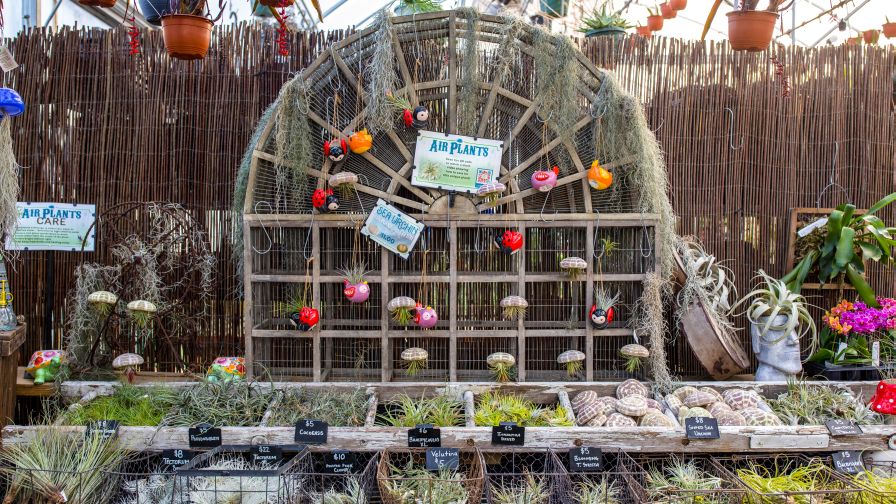
The retail store at Groovy Plants Ranch is designed to attract customers, such as this fun layout for air plants.
Retail Experience Draws Customers
In addition to its reputation for high-quality plants, Groovy Plants Ranch is also known for its relics. These vehicles, transformed with paint and plants to serve as an Instagram photo op, dot the property and draw in customers from near and far. The relics add to the retail experience and offer fun opportunities for customers to make memories with their friends and family.
The relics include a Volkswagen Beetle, a hippie van, a Chevrolet pick-up truck, a small crashed airplane, and a hobbit house. Children and adults alike love to explore the relics and take photos with them. Although Groovy Plants Ranch is near a highway, it is tucked between the trees and has a rural, natural feel.
“It’s an intentional approach to making sure it’s an enjoyable experience for anyone who comes, no matter where they’re coming from,” Jared says.
Although Groovy Plants Ranch is a business, it is not simply selling plants. It offers superior customer service, plant care tips, and events. Liz teaches several classes to create planters, terrariums, and holiday crafts with plants. The ranch also opens the barn for yoga classes. The events add value to GPR, Liz says, because these services are not available everywhere.
Instead of running sales, Jared looks for opportunities to build value behind his products. For example, every summer, GPR hosts a Succulent Solstice. Attendees can select their favorites from a store packed full of succulents, while also enjoying food trucks and speakers.
“I had the luxury of learning from people in the trade who had a relentless desire to see value built around the products we offer instead of devaluing them,” Jared says.
Felicia Bonaduce, Retail Manager, says she focuses on customer service. She builds relationships with customers and treats them like family. The retail team helps customers find what they need without pushing them for more sales. For example, if a customer buys an orchid, an employee will also help them find orchid bark and an orchid pot, which they will need in the future.
“We’re trying to get them what they need to be successful plant owners,” Bonaduce says.
In the store, there is signage to show the needs of each plant, such as whether it would thrive in a humid environment or a shady spot outdoors. Liz Hughes makes educational videos about how to care for various plants, and Bonaduce hears customers listening to Liz’s videos on their phones while standing in the store. GPR’s educational videos are available on Facebook, Instagram, TikTok, YouTube, and GroovyPlantsRanch.com.
Groovy Plants Ranch has a strong social media presence with dedicated followers on Facebook, Instagram, YouTube, and TikTok. The team posts high-quality photos regularly with catchy captions. If there is a post about new plants that arrived on a particular day, customers see the post and arrive at the store to buy the plants that same day.
GPR has a biweekly blog for consumer education called Penny Flora Thoughts. Also, Jared posts video walk-throughs once a week to give customers the inside scoop on what’s going on at the ranch.
For the last two years, Jared says it has been hard to keep up with demand. This year, he is looking forward to honing his craft and sharing intriguing plants with his customer base.
“This business started with nothing 16 years ago,” Jared says. “It’s not a powerhouse, but it’s supporting our family and our staff. Hustle and grind have been a huge part of that.”
Mentorship is Key
Co-owners Liz and Jared Hughes agree that mentorship has helped their business grow. By surrounding themselves with industry veterans and knowledgeable professionals, they have gleamed countless pieces of wisdom.
“Find coaches and surround yourself with smart people who you believe in,” Jared says. “Having a professional network is huge.”
He has developed relationships with suppliers by talking on the phone instead of exchanging emails. In fact, one of Jared’s keys to success is negotiating pricing with suppliers.
“When you assert yourself with a supplier, the business relationship comes up a couple levels,” Jared says. “Now they remember you. You care enough about your business to have a pricing conversation with them. It adds mutual respect if you’re not afraid to have those conversations.”
Hybridizing In-House
In 2018, Groovy Plants Ranch released Begonia ‘Canary Wings’ through Ball Seed. Jared Hughes says this is the world’s first chartreuse dragon-winged begonia.
“It’s pretty unusual for mom and pops to have patented plant material,” Jared says. “We do hybridizing in-house. ‘Canary Wings’ is one of our biggest hits so far.”
He is grateful for this partnership with Ball Seed to bring ‘Canary Wings’ to market. Jared says networking and building relationships in the industry is essential to success.




